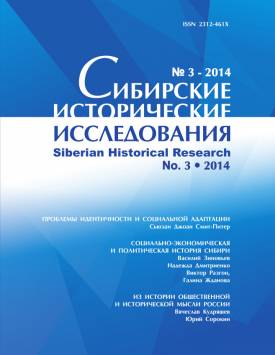Categories of Wages for Siberian Mine Workers in the Late 19 and Early 20 Centuries
The correlation of natural and monetary wages is an indicator of the maturity of the capitalist production. The higher is the share of cash in a wage, the more “purified” the relationship between the labour and the capital is supposed to be. This topic received much attention in the classical Marxist analysis of capitalist production. The paper analyzes the categories of wages paid to Siberian mine workers in the late 19 to the early 20 centuries. At that time the market and infrastructure were underdeveloped, and business owners were compelled to provide their employees with lodging, board and other services, reducing the share of cash remaining at the employees’ disposal. In Siberian mining industry natural wages which created the conditions for the “secondary” exploitation of workers and engendered social conflicts were almost never substituted for money. In the 19 century Siberia master’s board and lodging were a traditional means of payment to employees. In the 1860s to the 1880s the average share of ‘master’s board and lodging’ constituted 40 % of wages in Siberian plants and factories and from 25 to 35 % at goldmines. As the meals provided by the owner were scarce, workers always supplemented them with goods and food from shops belonging to the same owner. In the late 19 century “master’s board” was abolished by almost all of businessmen, substituted by the distribution of foodstuffs from shops on account of wages. On the basis of the author’s analysis of the reports submitted by enterprises and the results of official inspections, it has been revealed that the share of natural wages at Siberian mines showed no tendency to decreasing. Up to 1917 it constituted on average from 30 to 50 % of the total wages paid to Siberian miners. Workers had to get foodstuffs and other goods from the masters’ shops, they were also provided with lodging, medical services, and schooling for children. In the early 20 century the natural component of wages paid to Siberian mine workers was from 3 to 5 times higher than that paid to the workers of European Russia. The author raises a question about the factors accounting for the longtime preservation of natural wages in Siberian mining. He argues that the main reason for it was the weakness of Siberian retail trade which did not penetrate into the mining settlements. The role of retailers was taken on by the enterprises’ management. In Soviet times this role was performed by departments of supplies for workers (ORSy). In fact they occupied a monopoly position in this respect and that had the overpricing and lack of quality control as a result. Only enterprises located in Siberia’s well-developed areas, in particular mining plants, refused the functions of trade and provision of goods.
Keywords
натуральная заработная плата, хозяйские харчи, горнорабочие Сибири, natural wages, master’s board, Siberian mine workersAuthors
| Name | Organization | |
| Zinovyev Vasiliy P. | Tomsk State University |
References

Categories of Wages for Siberian Mine Workers in the Late 19 and Early 20 Centuries | Sibirskie Istoricheskie Issledovaniia – Siberian Historical Research. 2014. № 3.
